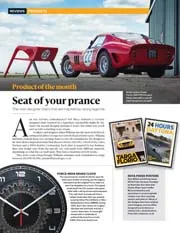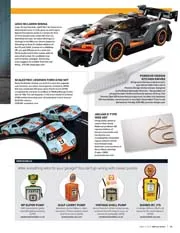

Products
Product of the month Are you sitting comfortably? No? Well perhaps a custom-designed chair inspired by a legendary automobile might fix the issue? On second thoughts perhaps it won’t, but…
ALTHOUGH most motorists who are in receipt of supplementary fuel rations have recently received an appreciable cut in those rations, the outlook is by no means a gloomy one. As the basic fuel ration remains unchanged, those who have been running out-and-out sports motor-cars purely or partially as a means of relaxation, find themselves no worse off than before. On the other hand, our world is by no means confined to this class of enthusiast these days, and the users of fast cars who do get an extra petrol supply clearly do so only because they employ their cars for journeys which are conducted very much in the national interest. This being so, even although it has been necessary to cut fuel allowances and so reduce the extent of such journeys, it is unlikely that more than a very small number of users so affected will be able, or compelled, to lay up their car in consequence. So motoring may be expected to continue throughout this summer much as it has since war began. In certain cases large cars may be replaced by smaller-engined vehicles so that the same mileage as before may be covered on the owner’s new fuel allowance; indeed, we hope that wherever this is practicable it will be undertaken. There is even a strong case for the sports car here, for when time-saving on road-travel is of the utmost importance, who will deny that our small sports cars are able to get about the country very pleasantly every bit as rapidly and securely as large utility cars and big American saloons, and on rather less than half the quantity of “Pool”? The British high-performance car in general is serving key-personnel very well indeed in the matter of war-time transport. When it is referred to as a “sports car” the unintelligent are apt to be shocked at the idea of big mileages being covered by keen drivers in such cars in war-time. They should remember that the present-day “sports car” is not merely a fun-machine, but a vehicle offering valuable fast transport, while burning its fuel economically and being essentially safe under difficult conditions. As such, it offers the best possible means of war-time travel for those to whom train and coach are of little avail in the pursuance of important tasks. If the traveller gets a deal of pleasurable relaxation while driving a car of this type, so much the better. Certainly the scaremongers can rest assured that the less dependable, more sporting fast cars are now either laid-up, awaiting happier times, or are being driven on the basic ration only, and consequently showing the Chancellor of the Exchequer a very handsome return. Since the commencement of hostilities we have carefully watched the attitude of officialdom towards the fast car handled by the expert driver. Very little may be disclosed of this matter at the present time, but one day there will be some remarkable stories to tell of long runs at very respectable average speeds, undertaken regularly in the national interest. We are extremely pleased to know that modern and vintage high-performance cars are playing a big part in such activities. There is, then, nothing much amiss with motoring within the limitations of war this summer of 1941, and we can continue to enjoy the long light evenings, which are appreciated by all who drive fast cars, whether by way of relaxation or duty. Another aspect of this question should also be borne in mind. The speed of one’s reaction to an emergency is greatly influenced by the familiarity which constant practice evokes, and once this facility is lost through lack of use it is not easily recovered. So from this point of view it is useful to permit the skilled fast driver to exercise his ability and keep hand, eye, and brain alert against the time when these qualities may once again be employed, in happier circumstances.